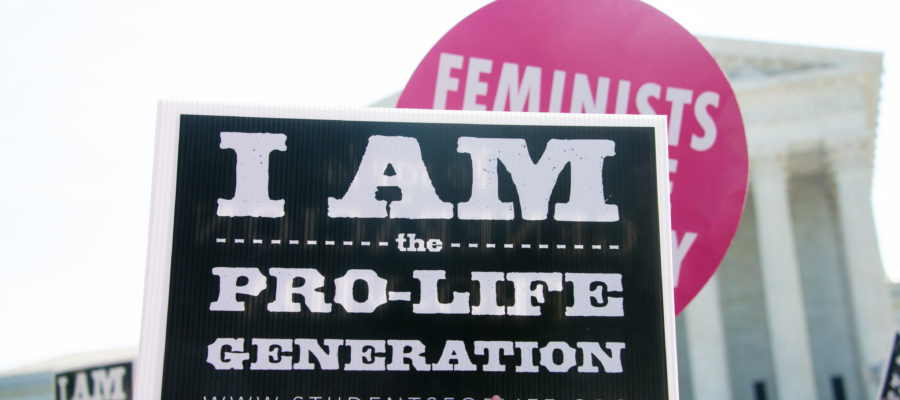Open your eyes, pro-life feminists are everywhere
May 24, 2018 | Published first in CNN
Politics — read “political parties and fundraisers” — largely refuse to make room for pro-life feminism or what it stands for.
Notice Democrats’ recent spat over whether taking a pro-life stance is an acceptable position for a Democratic candidate. Notice the failure of the Republicans currently in power to push through paid leave for working mothers. As for the media, unsurprisingly, they find themselves attending to the blood sport between Republicans and Democrats — and not to politicians or proposals possessing intellectually coherent solutions to the problems pro-life feminists care about.
So where are the voices and the hopes for pro-life feminism? These reside in less prominent venues than mainstream political parties or publications. You can find them in the minds, convictions and daily lives of millions of women in the United States who support — without question or conflict — meeting the needs of both women and unborn children.
And you can hear them in the effective leadership of major and emerging pro-life organizations arguing that America can do better for women and children.
When I began working in the pro-life movement in the late 1980s, while the “boots on the ground” were often female, the C-suites of organizations like the National Right to Life and Americans United for Life were occupied by men. Today, hands-down, the most visible voices and leaders in the movement are women — at the National Right to Life Committee, at Students for Life, at Live Action, at Americans United for Life, and at the March for Life.
In recent years, too, women have begun to spearhead many pro-life groups with explicitly pro-women agendas, which articulate how women’s rights are co-extensive with children’s rights: Feminists for Life, the Susan B. Anthony List, New Wave Feminists (with the inimitable slogan: Badass.ProLife.Feminist.), Rehumanize International (“Working to make aggressive violence a thing of the past through education, discourse, and action”), the Sisters of Life (a contemplative order dedicated to the “protection and enhancement of the sacredness of every human life” and providing ongoing support for mothers) and my own organization, Women Speak for Themselves (Empowering.Local.Voices).
If you’re paying attention, it’s impossible to miss the trend.
At the same time, pro-life feminism is visibly flourishing in the daily lives of millions of women in the US who don’t often talk about it. They just do it.
I have met them during my travels to 49 states. They include mothers in Denver running a medical clinic for poorer women, a New York City-based editor volunteering with single moms on the weekends, and a pro-life lawyer living in a safe house with traumatized, trafficked women.
Often, these women ignore or even abjure the “feminist” label because it is automatically associated with the primacy accorded to legal abortion by groups like Planned Parenthood and other national feminist groups.
But many of these women are what I think of as “anonymous feminists” just the same.
They know, live and openly articulate women’s essential equality and dignity, and women’s rights to the same opportunities afforded men. They want these opportunities not only for themselves, but also for their daughters, sisters, and friends. At the very same time, they recoil at the thought of abortion. Not because they are judging the women involved, but because — as even Justices John Paul Stevens and Ruth Bader Ginsburg have observed in their abortion opinions — abortion can be “gruesome” and “brutal.”
The pro-life feminists I know also wonder how any movement consistent with the magnificent bumper sticker that quotes Angela Davis — “Feminism is the radical idea that women are human beings” — can advocate destroying other human beings as a “right.” They wonder how a movement concerned with the vulnerable can advocate for the right to destroy life at its most vulnerable moment.
And it isn’t just about the unborn children — it’s about women and families. The pro-life feminists I know and count myself among, ask how women will ever win the political argument to extend social care to more groups of vulnerable people if we draw illogical and cynical lines between “deserving” and “undeserving” human lives.
And we cringe at the intellectual vacuity of any so-called “feminism” that would refuse to confront these complex questions head on and would instead divert the public’s attention to advertising campaigns about “choice” and “letting women decide.”
Pro-life feminism may be poised finally to “get its due,” however, because Americans are growing frustrated with two of the biggest social problems at the top of the pro-woman, pro-life agenda: sexual equality and work-life balance. Regarding employed mothers, we are long past due in the US for the realization that you don’t get a next generation, let alone a healthy one, if capitalism doesn’t make room for women’s ceaselessly expressed preference to do justice to their families first, while also fulfilling the demands of employment.
Regarding sexual equality, many supporters of legal abortion would reduce the solutions to contraception, abortion and “consent.” Yet these leave all the burdens to women — women alone with the abortion decision, women in ambiguous, casual encounters, usually alone with the decision of how far to go sexually, and women dealing with the fallout from harassment and misconduct.
Pro-life feminists understand that pro-woman answers rather involve building trust between men and women and remembering that sex has weight because it is organically linked to matters like love, kin, children and future.
My work at WomenSpeakforThemselves.com, for example, includes women sharing information and stories about the harms women suffer from uncommitted sex and synthetic contraceptive hormones. They also report the richness of sex within a committed versus merely “consensual” sex framework.
We hope to influence the next generation of women to understand that women deserve much much more than “consent.”
Now that we have a “post-Republican” President and a Democratic Party that needs to reach beyond its base to win again, maybe there is more room in politics for a pro-life feminism. Millions upon millions of American women sure hope so.
Copyright CNN 2018. All Rights Reserved. Reprinted with permission.



